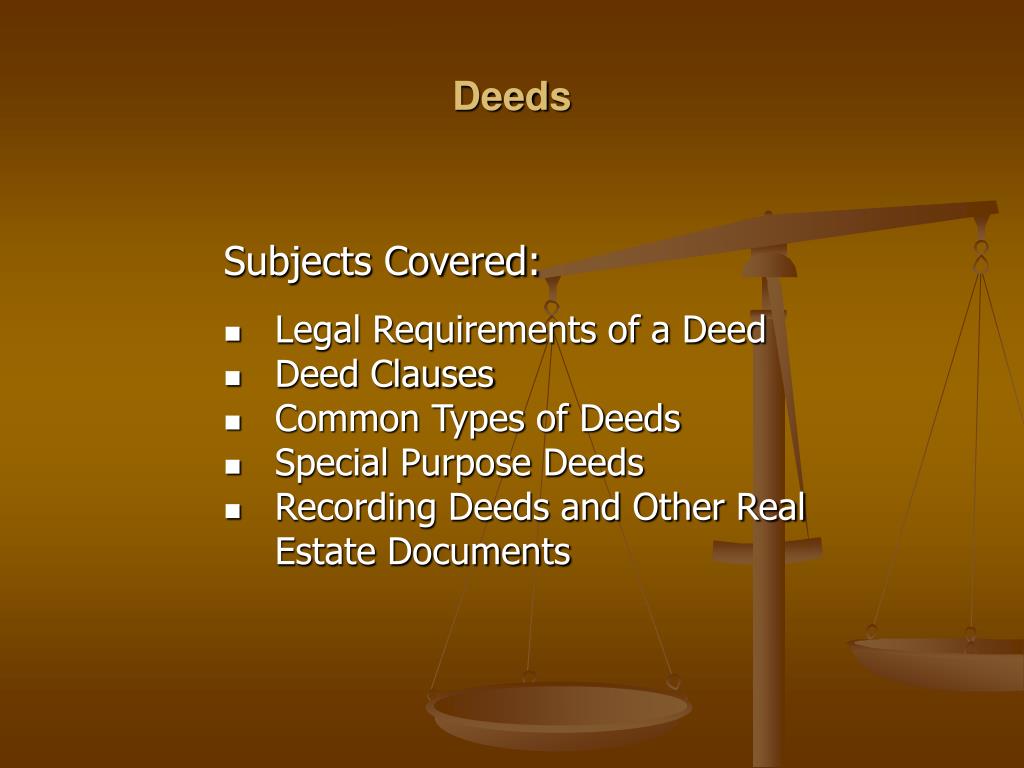Table Of Content

House deeds, also referred to as property deeds or real estate deeds, are typically drawn up by a real estate attorney. In most states, the grantor will be required to get the document notarized. The grantor is also responsible for ensuring the deed is delivered to the grantee. Having a house deed means that you’re the rightful owner who holds title to your house. By having a proper, recorded deed, your property ownership cannot be questioned. It also means that you have the full right to do what you want with the property, such as making changes to it, taking out a new mortgage, or even selling the property.
A Guide to Property Deeds - What You Need to Know

If there is more than one new owner, you are moving the real estate into or out of a trust, or the new owner is married, the form of title can have important effects. In this guide, we went over several simple steps on how to get the deed to your house. Thanks to technology, you can often search for, locate, and download a copy of your deed through your county’s records search tool. If you were lucky, you may have already located your deed and won’t need the rest of these steps. However, in some cases, a simple web search may not yield any results.
What Is Real Property?
Working with an adviser may come with potential downsides such as payment of fees (which will reduce returns). There are no guarantees that working with an adviser will yield positive returns. The existence of a fiduciary duty does not prevent the rise of potential conflicts of interest. 1Based on Rocket Mortgage data in comparison to public data records. Based on the information you have provided, you are eligible to continue your home loan process online with Rocket Mortgage.
Rocket Sister Companies

These are both legal concepts that relate to your ownership of a property. When you own a property, you own both the property deed and title to that particular property. The property deed is the physical legal document that transfers ownership and proves who the legal owner of the property is. It holds critical information about the property, such as who the house was bought from, and who it was sold to. House deeds are the primary way that a homeowner can definitively demonstrate ownership of their home in the event of a property dispute. During a real estate transaction, both the buyer and the seller should verify that the deed was completed correctly to reflect the transfer of ownership.
What Is Chain Of Title In Real Estate Investing?
Detroit nonprofit housing director stole over 30 properties in 'deed fraud' scheme, feds say - FOX 2 Detroit
Detroit nonprofit housing director stole over 30 properties in 'deed fraud' scheme, feds say.
Posted: Wed, 28 Feb 2024 08:00:00 GMT [source]
If you’re a grantee (the person purchasing property), a general warranty deed will give you the highest level of protection. Using this type of deed, the grantor makes covenants, which is a set of legally-binding promises. These warranties are agreeing to protect you, the grantee, from any claims or demands of any parties in regards to the property. These claims can stem from any time, even before the grantor held title to the property.
Depending on state law, this is either done with a real estate attorney or a title company representative. The history of the transferring of ownership rights is known as the chain of title, and as you sign the deed to become an owner, you become part of that chain. In other words, only defects that arose during the grantor's ownership of the property are warranted.
The understanding cap rate can help investors make informed decisions when evaluating potential investment properties. If visiting or contacting your County Recorder’s Office is inaccessible to you, you can also request your deed by mail. You will typically need to obtain and fill out the necessary forms, such as a Title Deed Request and enclose a payment. Even easier, your county likely offers a way to make the request by email and make your payment online. Deeds are public documents, so you may need to present the changes you want to make in court. Assuming these changes are approved, you’ll need to document these changes with the Recorder of Deeds in your county.
Time Is Of The Essence: Defined And Explained
William M. Holder conveyed property on a public road to Jonathan D. Downing for $316,000. Todd A. Kauffman conveyed property on a public road to Chhabi L. Luitel and Durga Acharya for $470,000. Denver Main LLC conveyed property on a public road to 20 Main LLC for $250,000. Scott Arbaugh and Olivia J. Dombach conveyed property on a public road to Olivia J. Dombach for $1. Amos S. Lapp and Arie S. Lapp conveyed property on a public road to Melvin E. Lapp and Lizzie King Lapp for $1.
Recorder
If a defect to the property’s title is found later on, a grantee with a general warranty deed can sue the grantor for damages. The grantee also won’t be responsible for paying off any encumbrances found after taking ownership of the property. Even if the title defect occurred before the grantor assumed property ownership, the grantor is still legally responsible. There is an additional $75 fee on mortgage refinances and other real estate transactions that are exempt from Documentary Transfer Tax. Contact your county recorder’s office to determine the total amount you will need to pay. An interspousal deed is used between spouses or registered domestic partners (“DP”) to change real estate to or from community property.
For instance, someone may use a survivorship deed if they want to add their spouse or another individual as a co-owner to ensure automatic inheritance of each other’s share upon death. In a standard home loan, the homebuyer is the borrower, the bank is the lender, and a title company acts as the trustee. If the borrower defaults, the title company can initiate a foreclosure on behalf of the bank. The key difference, however, is that the warranty provided only applies to the time when the grantor owned the property.
If a single parent added a child to the deed, the parent would need to report 50% of the value of the home as a taxable gift (based on fair market value of the home at the time of transfer). If the person who inherits the home doesn't want to keep ownership of it, they may incur legal fees, taxes, and other transaction costs. In addition, several states have estate tax exemption limits far below the federal level.

No comments:
Post a Comment